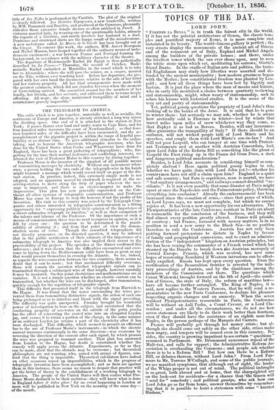TOPICS OF THE DAY.
LORD JOHN.
" FIRENZE LA. BELLA " is in truth the fairest city in the world. If it has not the palatial architecture of Genoa, the classic tem- ples and pontifical majesty. of Rome, it is more coniplete and untainted in its beauty. The world-famous gallery is perfect ; the very streets display the monuments of the ancient art of Greece and of the renascent art of Italy, Raphael and Michel Angelo among the builders of the private houses ; and there, under the loveliest tower which the sun ever shone upon, may be seen the white stone upon which sat, meditating his sorrows, Giotto's friend Dante. In the cradle of Italian arts and politics, the taste- ful Englishman may study how liberties were asserted and de- fended by the ancient municipality ; how modern greatness began with the Medici ; how constitutional freedom was planted by Leo- pold ; and how all these things have been lost by bigotry and faction. It is just the place where the man of means and leisure, who in early life meditated a choice between quarterly, reviewing and statesmanship, might, when weary of statesmanship, seek to solace his leisure with historical studies. It is the scene of the very art and poetry of statesmanship. Yet, political gossip questions the propriety of Lord John's thus rushing off to the banks of the Arno. It is said that he is gone to winter there : but seriously we may ask, whether he is aware how aretically cold is Florence in winter—iced by winds that travel miles upon miles of snow whichever way they come, so that Zephyr is as bad as Boreas. Besides, will any insurance- office guarantee the tranquillity of Italy, ? If there should be an outburst, will not wicked people talk of Lord Minto and his speeches, and couple them with Lord Minto's son-in-law ? And will not poor Leopold, who can tamper at one time with Protest- ant Testaments and at another with Austrian Concordats, look upon Lord John of the Reform Bill as something like the ghost of Leopold the First rising up in the Piazza del Gran Duca, a dark and dangerous political anachronism ?
Besides, is Lord John accurate in considering himself so com- pletely shelved ? Here again political gossip begins to ask, whether we have quite done with Lord Johnyet ?—whether his
countrymen have not still a claim upon him? England is a. quiet and safe country ; but Fate is capricious, man is mortal, we have " bad sanitary arrangements," and railways commit dreadful "ac- cidents." Is it not even possible that some disaster at Paris might upset at once the Napoleonic and the Palmerstonic policy, throwing everything into confusion? Already the embarrassment has been increased since the cessation of arms,—since that peace of which, as Lord Lyons says, we must not complain, but which we cannot rejoice at. It has been a new opportUnity for our adversaries. The Plenipotentiaries of the late Conference resident in Paris are about to reassemble for the conclusion of the business, and they will find almost every position greatly altered. France will preside, of courtesy ; but France, harassed with money matters, is in no position to send a new army to the Black Sea—in no position therefore to rule the Conference. Austria has not only been putting forward pretensions to dictate in Naples by favour of family and geographical connexions, and to exact an adminis- tration of the " independent" kingdom on Austrian principles, but she has been vexing the commander of a French vessel which has steamed up the Danube to break down the Austrian monopoly of Central Europe. Prussia, which was neutral, has now some hopes of recovering Neuchitel if Western intrusions can be effect- ually expelled. Russia has kept open every question. Even the rectification of the Bessarabian frontier is arrested by the mili- tary proceedings of Austria, and by the dissidence among the members of the Commission out there. The questions -which Count Walewski brought forward on the 8th of April—the condi- tion of Greece, the state of Italy, the reform of maritime law— have all become further entangled. The King of Naples, it is said, now replies to the Western Powers, that he will send a re- presentative to the new Paris Conference, to declare his pleasure respecting organic changes and an amnesty. When the seven resident Plenipotentiaries reassemble in Paris, the Conference will be without an Aali Pasha, a Count Cavonr, or a Lord Cla- rendon ; and under all the circumstances, we do not see how seven statesmen are likely to do their work better than fourteen, even if they should have the assistance of an eighth man from Naples, in the person perhaps of the Marquis del Carreto. France will probably get through her money crisis ; but al- though she should come out safely on the other side, crises make men angry, and tempers will be soured even in this country. Be- sides, the country is growing impatient to see certain " questions" resumed in Parliament. Mr. Drummond announces repeal of the Malt-tax, and calls for support; the Administrative Reform As- sociation is overhauling the Commons.; and people ask whether there is to be a Reform Bill ? But how can there be a Reform Bill, or debates thereon, without Lord John.? From Lord Pan- mure to Mr. Torrens M'Cullagh, and some of the public journals, we see manifect symptoms, that although out of sight, the leader of the Whigs proper is not out of mind. The political imbroglio is so great, both abroad and at home, that the sharpsighted are on the look-out for accidents—for a chance that 'the Queen will "send for" somebody ; and politieal gossips, who ask how can Lord John go so far from home, answer themselves by remember- ing that it is possible to hunt a statesman with some " hurried Hudson."


























 Previous page
Previous page